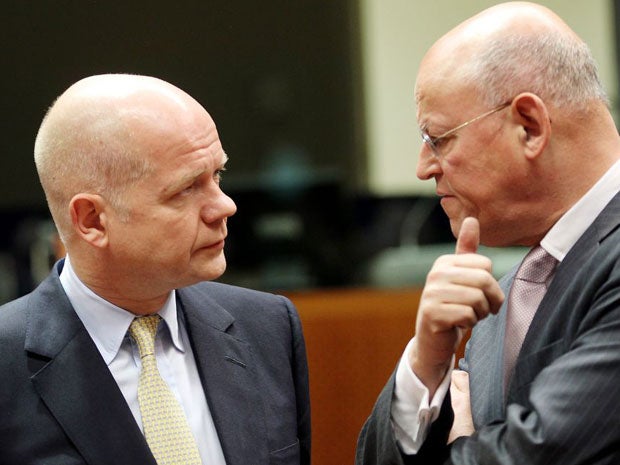
Your support helps us to tell the story
From reproductive rights to climate change to Big Tech, The Independent is on the ground when the story is developing. Whether it's investigating the financials of Elon Musk's pro-Trump PAC or producing our latest documentary, 'The A Word', which shines a light on the American women fighting for reproductive rights, we know how important it is to parse out the facts from the messaging.
At such a critical moment in US history, we need reporters on the ground. Your donation allows us to keep sending journalists to speak to both sides of the story.
The Independent is trusted by Americans across the entire political spectrum. And unlike many other quality news outlets, we choose not to lock Americans out of our reporting and analysis with paywalls. We believe quality journalism should be available to everyone, paid for by those who can afford it.
Your support makes all the difference.Red Cross teams have reached the Syrian city of Hama for the first time in more than a month delivering aid to a populace battered by the military crackdown on the anti-government uprising.
Activist groups reported the death toll for 11 months of unrest has now surpassed 8,000.
An International Committee of the Red Cross spokesman said a joint team of the ICRC and Syrian Arab Red Crescent brought supplies of food and other items for 12,000 people.
The city has been hard hit by the government crackdown and villages and towns nearby frequently witness anti-government protests and clashes between troops and military defectors.
Meanwhile Russian prime minister Vladimir Putin warned against military intervention in Syria or an attack on its ally Iran in scathing criticism of the West. He said the West had backed the Arab Spring to advance its own interests in the region, and that instead of promoting democracy, the revolts had given rise to religious extremism.
Russia has been one of president Bashar Assad's strongest supporters and along with China, vetoed two UN Security Council resolutions backing Arab League plans aimed at ending the conflict and condemning Assad's crackdown. Russia has said it will block any UN resolution that could pave the way for a replay of what happened in Libya. In that case, Russia abstained from a vote that cleared the way for months of Nato airstrikes that helped Libyans end Muammar Gaddafi's regime.
Mr Putin's comments came after the US and its European and Arab allies met on Friday at a major international conference on the Syrian crisis in Tunisia, trying to forge a unified strategy to push Assad from power. They began planning a civilian peacekeeping mission to deploy after the regime falls.
In Brussels, European foreign ministers increased the pressure on Assad by freezing the assets of several Syrian government officials and imposing sanctions on the country's central bank. They also banned the purchase of gold, precious metals and diamonds from the country, and banned Syrian cargo flights from the European Union.
The EU had previously imposed several rounds of sanctions on Syria, freezing the assets of 100 people and 38 organizations, and trying to cut the country's supply of equipment for its oil and gas sectors.
So far the EU sanctions have had little effect.
On Sunday, Syria held a referendum on a new constitution in what the US and its allies dismissed as a "farce" meant to justify the bloody crackdown on dissent.
The new constitution allows - at least in theory - for the formation of competing political parties and limits the president to two seven-year terms. Such change was unthinkable a year ago. Syria has been ruled by the Baath party since it seized power in a coup in 1963 and the Assad family has ruled since Assad's father Hafez took over in another coup in 1970.
Meanwhile the Syrian government said voters have approved a new constitution in a vote that the West has dismissed as a "farce" meant to justify deadly crackdowns on dissent.
Syrian state TV said Monday that 89% of approved the new document while 9% rejected it.
President Bashar Assad has presented the new charter as a step toward reform.
Join our commenting forum
Join thought-provoking conversations, follow other Independent readers and see their replies
Comments